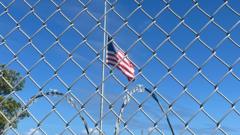The fate of Khalid Sheikh Mohammed (KSM), the alleged mastermind of the September 11 terror attacks, has taken a new turn as the U.S. government intervenes to block his planned guilty plea. The plea was scheduled to occur at the Guantanamo Bay naval base, where Mohammed has been detained for nearly 20 years. Government officials expressed concerns that permitting the plea would inflict "irreparable" harm to both legal proceedings and the public, prompting a federal appeals court to halt the hearing and consider the objections raised.
Khalid Sheikh Mohammed faces charges related to the 2,976 victims of the 9/11 attacks, including conspiracy and murder. He has previously claimed responsibility for planning the attacks, which involved hijacking planes to strike the World Trade Center and the Pentagon. The plea deals reached last summer aimed to spare him from a death penalty trial and allow a military jury an opportunity to hear statements from victims' families, potentially serving as a form of public trial.
The U.S. government, led by Defense Secretary Lloyd Austin, appears caught off guard by the deal and later attempted to withdraw it, arguing such steps should require his authority. Despite military judges affirming the plea agreements, the administration sought federal intervention citing the profound implications of the attacks on U.S. soil and the necessity for a comprehensive trial.
This complicated legal saga has unfolded over more than a decade, significantly affected by controversies surrounding evidence obtained through torture during Mohammed's detention in CIA black sites. Legal experts suggest this has made it exceedingly difficult to prosecute the case while adhering to U.S. jurisprudence standards.
Families of 9/11 victims remain divided on the plea deals. Some feel justice is being undermined and expressed dismay over the government’s recent actions, while others hope that a resolution can finally conclude the prolonged legal battle. Critics, including Republican leaders, have decried the agreements as insufficient and overly lenient.
Amidst the ongoing discussions in Guantanamo Bay, the broader implications of the military commissions and the associated delays reveal not just the complexity of prosecuting terrorism-related cases, but also the persistent struggle for closure among the families of those who lost their lives on that tragic day. The outcome of the case remains uncertain, reflecting the tense intersection of national security interests and the quest for justice within the American legal framework.




















